
Lynn Renée Anderson was an American country singer and television personality. Her crossover signature recording, "Rose Garden," was a number one hit in the United States and internationally. She also charted five number one and 18 top-ten singles on the Billboard country songs chart. Anderson is regarded as one of country music's most significant performers.

Henry William Thompson was an American country music singer-songwriter and musician whose career spanned seven decades.

Merle Robert Travis was an American country and western singer, songwriter, and guitarist born in Rosewood, Kentucky, United States. His songs' lyrics often discussed both the lives and the economic exploitation of American coal miners. Among his many well-known songs and recordings are "Sixteen Tons", "Re-Enlistment Blues", "I am a Pilgrim" and "Dark as a Dungeon". However, it is his unique guitar style, still called "Travis picking" by guitarists, as well as his interpretations of the rich musical traditions of his native Muhlenberg County, Kentucky, for which he is best known today. Travis picking is a syncopated style of guitar fingerpicking rooted in ragtime music in which alternating chords and bass notes are plucked by the thumb while melodies are simultaneously plucked by the index finger. He was inducted into the Nashville Songwriters Hall of Fame in 1970 and elected to the Country Music Hall of Fame in 1977.
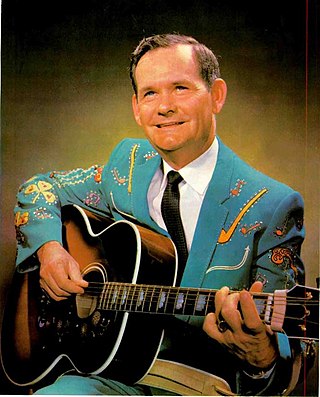
Hank Locklin was an American country music singer-songwriter. He had 70 chart singles, including two number one hits on Billboard's country chart. His biggest hits included "Send Me the Pillow You Dream On" and his signature "Please Help Me, I'm Falling". The latter also went to number eight on the Billboard Hot 100 pop music chart. Billboard's 100th anniversary issue listed it as the second most successful country single of the rock and roll era. It sold over one million copies, and was awarded a gold disc by the RIAA.

Clyde Julian "Red" Foley was an American musician who made a major contribution to the growth of country music after World War II.

"I'll See You in My Dreams" is a popular song, composed by Isham Jones, with lyrics by Gus Kahn, and published in 1924. It was recorded on December 4 that year, by Isham Jones conducting Ray Miller's Orchestra. Released on Brunswick Records, it charted for 16 weeks during 1925, spending seven weeks at number 1 in the United States. Other popular versions in 1925 were by Marion Harris; Paul Whiteman; Ford & Glenn; and Lewis James; with three of these four reaching the Top 10.

Herbert Clayton Penny was an American musician who played banjo mainly in the Western swing genre. He also worked as a comedian best known for his backwoods character "That Plain Ol' Country Boy" on TV with Spade Cooley. He was married to country singer Sue Thompson from 1953–63.

"Smoke! Smoke! Smoke! " is a Western swing novelty song written by Merle Travis and Tex Williams, for Williams and his talking blues style of singing. Travis wrote the bulk of the song. The original Williams version went to number one for 16 non-consecutive weeks on the Hot Country Songs chart and became a #1 hit in August 1947 and remained at the top of the "Best Sellers in Stores" chart for six weeks. It was written in 1947 and recorded on March 27, 1947, at Radio Recorders in Hollywood.

"Blue Eyes Crying in the Rain" is a song written by songwriter Fred Rose. First recorded by Elton Britt in 1946, then made more popular by Roy Acuff in 1947, the song has been covered by many artists, including Hank Williams Sr., Johnny Russell, Charley Pride, and Elvis Presley. Most notably, the song was recorded by Willie Nelson as part of his 1975 album Red Headed Stranger. Both the song and album revived Nelson's success as a singer and recording artist.

The albums discography of American country artist, George Jones contains 80 studio albums, 132 compilation albums, three live albums, ten video albums and seven box sets. Of his studio albums, 69 are solo releases while 11 are collaborative releases. In 1956, Jones's debut studio LP was issued on Starday Records titled, Grand Ole Opry's New Star. The label only issued one studio effort, but would release a series of compilation. On Mercury Records, Jones released six studio LP's including Country Church Time (1959) and George Jones Salutes Hank Williams (1960). He switched to the United Artists label in 1962, where he released 13 studio LP's. Among these was a collaborative LP with Melba Montgomery called What's in Our Hearts (1963), which was his first to chart the Billboard Top Country Albums survey. He moved to Musicor in 1965. Among the label's studio LP's was I'm a People (1966), which reached the top of the Billboard country survey. Musicor also issued his first collaborative studio album with Gene Pitney, which made the Billboard country LP's chart and the Billboard 200.
Wayne Carson, sometimes credited as Wayne Carson Thompson, was an American country musician, songwriter, and record producer. He played percussion, piano, guitar, and bass. His most famous songs as a writer include "The Letter", "Neon Rainbow", "Soul Deep", and "Always on My Mind".
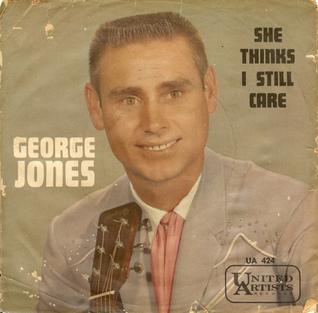
"She Thinks I Still Care" is a country song written by Dickey Lee and Steve Duffy. The song was recorded by multiple artists, including George Jones, Connie Francis, Anne Murray, Elvis Presley and Patty Loveless.
"I Don't Hurt Anymore" is a 1954 song by Hank Snow. It was written by Don Robertson and Jack Rollins.

The albums discography of American country singer-songwriter Bill Anderson contains 45 studio albums, three live albums, 13 compilation albums, four extended plays and one box set. He first signed with Decca Records in 1958 and started releasing singles which became major hits. However, Anderson's first album was not released until 1962. Entitled Bill Anderson Sings Country Heart Songs, the package was a compilation release containing his major hits up to that point. His debut studio release, Still, followed upon the success of its title track in 1963. The release peaked at number 10 on the Billboard Top Country Albums chart and number 36 on the Billboard 200, his only album to chart the latter survey. Over the next decade, Anderson released several albums per year, many of which reached the top ten on the Billboard country albums chart. His second studio release, Bill Anderson Sings (1964), reached number seven on the chart for example. In 1966, his fifth studio album, I Love You Drops, reached number one the country albums list. In 1967, Anderson recorded his first album of gospel music called I Can Do Nothing Alone, which reached number 23 on the country albums survey. His eighth studio record, For Loving You (1968), was a collaborative project with Jan Howard. It reached number six on the country albums chart.
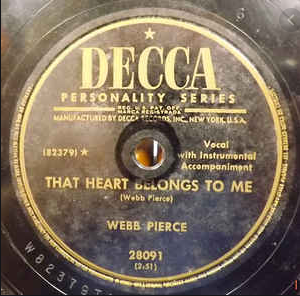
"That Heart Belongs to Me" is a country music song written and recorded by Webb Pierce. It was released in 1952 on the Decca label. In June 1952, the song reached the No. 1 spot on the Jockey chart. It peaked at No. 2 on the Juke Box chart and No. 5 on the Best Seller chart. In Billboard's year-end country chart for 1952, it ranked No. 20.
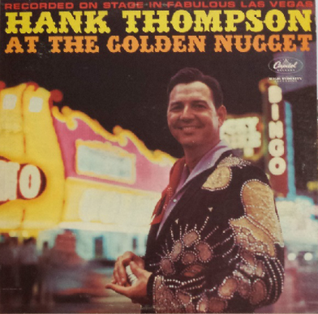
Hank Thompson at the Golden Nugget is a live album by country music artist Hank Thompson and His Brazos Valley Boys. It was released in October 1961 by Capitol Records. Ken Nelson was the producer.

A Six Pack to Go is an album by country music artist Hank Thompson and His Brazos Valley Boys. It was released in 1966 by Capitol Records. Ken Nelson was the producer. The album consists of 12 songs related to drinking.
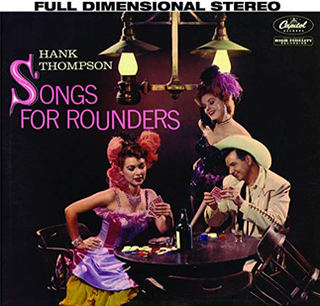
Songs for Rounders is an album by country music artist Hank Thompson and His Brazos Valley Boys. It was released in 1959 by Capitol Records. Ken Nelson was the producer. It was Thompson's first stereo album.

Smoky the Bar is an album by country music artist Hank Thompson and the Brazos Valley Boys. It was released in 1969 by Dot Records. Joe Allison was the producer. It is an album of songs related to drinking, partying, and bars.

















